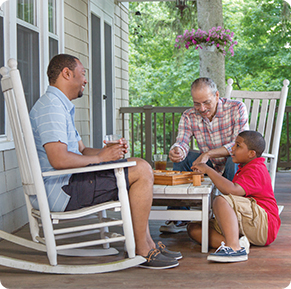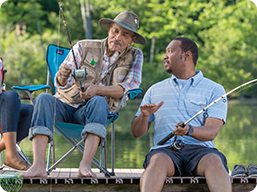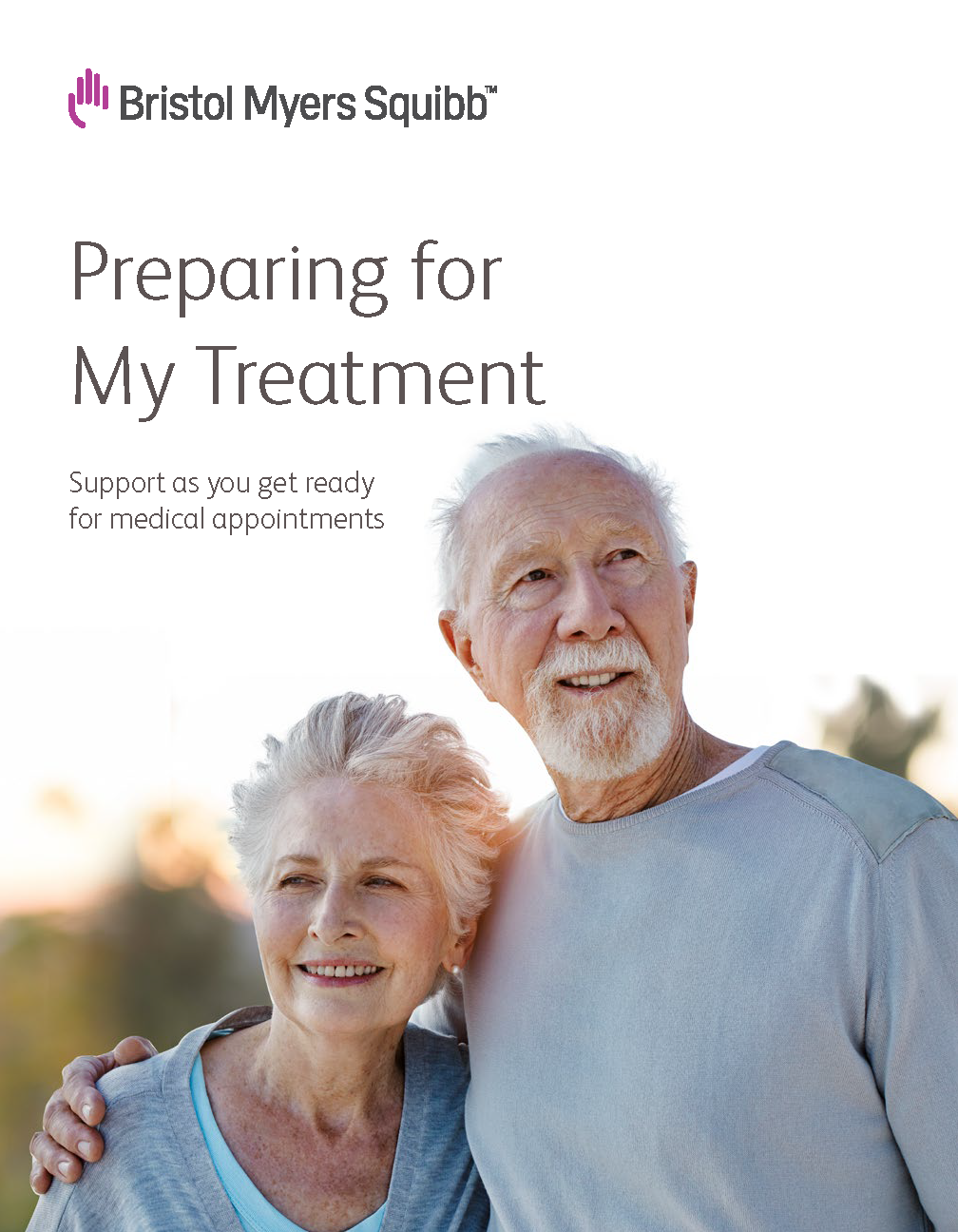Financial Support and Educational Resources
Patient Access, Reimbursement, and Co-Pay Support

Bristol Myers Squibb is committed to helping patients gain access to their prescribed BMS medications. That’s why we offer the BMS Access Support® program, which provides resources to help patients understand their insurance coverage and find information on sources of financial support, including co-pay assistance for eligible commercially insured patients. For more information, ask your doctor, visit BMS Access Support, or call BMS Access Support® at 1-800-861-0048, 8 AM to 8 PM ET, Monday-Friday.

As a caregiver, where can I find support and resources?
Where can I find support as a caregiver?
One of the biggest challenges you may face as a caregiver to a person with advanced non–small cell lung cancer is asking for help. Balancing your loved one’s needs with your own can be challenging. But you don’t have to go through it alone. Here are some tips to help you get the support you need.

 Learn as much as you can about advanced NSCLC and your loved one’s treatment plan.
Learn as much as you can about advanced NSCLC and your loved one’s treatment plan. Be clear and direct so you can learn how best to help your loved one.
Be clear and direct so you can learn how best to help your loved one. Besides attending doctor visits together, do things that have nothing to do with your loved one’s illness, like going to a movie or taking a walk outdoors. If your loved one is able to.
Besides attending doctor visits together, do things that have nothing to do with your loved one’s illness, like going to a movie or taking a walk outdoors. If your loved one is able to. Make a list of activities that other friends or family members can sign up for. They may be waiting to find out what they can do to help.
Make a list of activities that other friends or family members can sign up for. They may be waiting to find out what they can do to help. There is no substitute for talking to people who are going through the same experience as you.
There is no substitute for talking to people who are going through the same experience as you.Remember, asking for help doesn’t mean that you’re not a good caregiver. It allows you to focus on the bigger responsibilities of a caregiver for a loved one with advanced cancer.
For more information on caregiver support, visit the following organizations. Many have numerous resources and avenues for connecting with other caregivers.
The independent organizations listed are provided as an additional resource for obtaining information related to cancer and advanced NSCLC. Inclusion on this list does not indicate endorsement by Bristol-Myers Squibb Company of an organization or its communications.
As a patient, where can I learn more? Support and resources
Where can I find support?
Support can come from many sources—your family, friends, colleagues—even strangers who eventually become friends as you join a community of people facing similar challenges. Support can also come from organizations that provide resources to help you better understand what to expect living with advanced cancer. Knowing what to look for and where to turn are key to getting the support you need.
How can I get the support I need?
Family members, friends, neighbors, coworkers, and other people close to you are among your most important care partners. Your cancer diagnosis affects everyone who cares about you. Many of the people in your personal circle want to help but may not know how.
Here are some things you may want to ask your caregivers to help you with:
- Gather information, and help you make decisions
- Go with you to doctor visits and checkups
- Make a list of your medical and emergency contacts
- Help with financial, legal, or health insurance matters
- Organize volunteers to bring you meals, take you to treatments, or run errands for you
- Help keep up your appetite, weight, and strength by cooking tempting foods and creating pleasant settings for meals
- Listen when you need to vent your feelings or frustrations
- Entertain you or keep you company when you want to relax or have fun
- Help with household chores like laundry, cleaning, grocery shopping, or dog walking
- Go for walks with you to help you stay active
How can I talk to my loved ones about my cancer?
Letting your family and friends know about what you are going through can bring you comfort. But it can also be stressful. People do not always react the way you hope they will. These tips may help make it easier to talk with others about your cancer.

- Give some thought to what you might say. Think about what you want other people to know and write it down
- Decide who to tell and when. You may want to start with a close friend who has “been there for you” in the past. Choose a time to talk that feels right to you
- Find the best way to share the information. You may want to tell some people face to face, some on the phone, and others by sending a letter or e-mail
- Seek expert advice. If you are unsure of what to say, it might help to talk with an oncology social worker or other people who are living with advanced cancer
- Keep talking. If friends or loved ones react poorly or cannot handle your news, let them know how that makes you feel. Give them a little time to face their own fears about your cancer

Patient Resources
The downloadable resources available on this website have been developed to help you
- Be prepared for treatment
- Work closely and effectively with your healthcare team
- Receive and remember important information during treatment
Preparing for My Treatment 
Offers a checklist of steps to take to help prepare yourself for treatment. Also includes information you should share with your doctor and questions to ask your doctor or nurse before treatment begins.
Where can I find information and support online?
Your need for services, support, and information about advanced non–small cell lung cancer (NSCLC) may change over time. Knowing where to find the resources you need to help manage these challenges can help you feel more in control. Use the resources listed below to get answers, advice, and help from advocacy groups and peers who understand the needs and concerns of people with advanced NSCLC.
These organizations do not replace talking with your doctor. Ask your healthcare team about other resources they can recommend.
The independent organizations listed are provided as an additional resource for obtaining information related to cancer and advanced pancreatic cancer. Inclusion on this list does not indicate endorsement by Bristol-Myers Squibb Company of an organization or its communications.
Wondering what to do first?
Learning more about your condition
Lung Cancer Alliance
lungcanceralliance.org 1-800-298-2436
American Lung Cancer Association
Free to Breathe
- Advice from experts
- Telephone support
- Patient stories
- Booklets and newsletters
- Referrals to resources
- Conference and webinars
Connecting with other patients and support groups on the Internet, by phone, or in person
LUNGevity LifeLine
Information to help you find a support group in your area and links to telephone, online, or professional support resources
To find a support group in your area
LungCancer.org (a service of CancerCare®)
Cancer Support Community
To connect online with other survivors and caregivers
LUNGevity Lung Cancer Support Community
American Lung Association Lung Connection
Seeking help for anxiety or depression due to cancer-related health issues
American Psychosocial Oncology Society (APOS) Helpline
Getting support to stop smoking
Smokefree.gov
Help from your state quit line
Legacy EX Plan
Getting advice on how to talk with your healthcare team
Open to Options®
Understanding your type of cancer and treatment options
National Cancer Institute (NCI) Cancer Information Service
American Cancer Society
National Institute on Aging
Choosing an insurance plan or paying for coverage
Health Insurance Marketplace
Centers for Medicare & Medicaid Services
Patient Advocate Foundation (PAF)
Seeking information about financial or legal issues related to cancer
Getting help with the cost of transportation to and from treatment
CancerCare® Get You There
American Cancer Society
Getting information on pain or side effects of treatment to discuss with your healthcare team
CancerCare®
National Cancer Institute (NCI) Cancer Information Service
Learning how to cope with hair loss and skin changes
Look Good Feel Better
Lining up home care or help for older adults
Eldercare Locator
Organizing help from friends and family
Getting support for caregivers
LUNGevity Caregiver Community
lungevity.org/caregiver 1-844-360-5864
CancerCare®
Family Caregiver Alliance
Wondering what to do first?
Learning more about your condition
Connecting with other patients and support groups on the Internet, by phone, or in person
Seeking help for anxiety or depression due to cancer-related health issues
Getting support to stop smoking
Getting advice on how to talk with your healthcare team
Understanding your type of cancer and treatment options
Choosing an insurance plan or paying for coverage
Seeking information about financial or legal issues related to cancer
Getting help with the cost of transportation to and from treatment
Getting information on pain or side effects of treatment to discuss with your healthcare team
Learning how to cope with hair loss and skin changes
Lining up home care or help for older adults
Organizing help from friends and family
Getting support for caregivers
Where can I find cultural resources?
Cancer is individual and very personal. One person’s experience may be very different from another’s experience. There are many things that make living with any illness personal, including a person’s culture or ethnicity. The organizations listed below offer information and resources specific to certain ethnic groups and cultures.
African Americans
Blackdoctor.org
312-222-1205
Health news and features specifically targeted to African Americans. Includes information written in everyday language, a searchable directory of qualified African American doctors, and community blogs on thought-provoking information from health writers and doctors.
Hispanic Americans
Latinas Contra Cancer
1-888-522-8110
Education, navigation, and support for the underserved Latino population affected by cancer. Bilingual services include educational workshops, support groups, case management, and patient navigation.
National Alliance for Hispanic Health
healthyamericas.org/more-resources
202-387-5000
Programs that focus on improving the health and well-being of Hispanics and securing health for all. Available resources include the Let’s Talk About Living With Cancer (Hablemos sobre la vida con cancer) bilingual booklet that provides those living with cancer as well as their friends and family with general information and resources on cancer.
Asian Americans
Asian American Health Initiative
240-777-4517
Programs and activities that help narrow the communication gap created by language and cultural barriers, and navigation of an unfamiliar healthcare system for Asian Americans. Resources include a library of downloadable brochures, videos, blogs, and a calendar of events.
Asian and Pacific Islander American Health Forum
415-954-9988
Educational tools and materials to help people understand healthcare reform and its impact on Asian Americans, Native Hawaiians, and Pacific Islanders.
Various Ethnic Groups
US Department of Health and Human Services Office of Minority Health
240-453-2882
A one-stop source for minority health literature, research, and referrals for consumers, community organizations, and health professionals. Information on health issues specific to African Americans, Native Americans and Alaska Natives, Asian Americans, Hispanics, Native Hawaiians, and Pacific Islanders is available through the Resource Center, from access to online documents to database searches to customized responses to requests for information and assistance.




